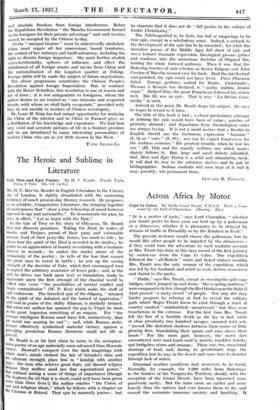The Heroic and Sublime in Literature
God, Man and Epic Poetry. By 1-1. V. Ruth. Univ.. Press, 2 V0113. 12s. ed. each.) Ma. H. V. ROUTH, Reader in English Literature in the Univer- sity of London, is rightly dissatisfied with the narrowing tendency of much present-day literary research. He proposes, as an antidote, Comparative Literature, the bringing together of masterpieces that" show a true fellowship of mood however opposed in age and nationality." To demonstrate his plan, he says, in effect, "Let us begin with the Epic." In the tale of Troy or the story of Odysseus, Mr. Routh does not discover greatness. Taking the Iliad, he writes of Greeks and Trojans, proud of their puny and vulnerable armour, fond of their pony-like horses, too small to ride; he shows how the spirit of the Iliad is revealed in its similes; he Points to an appreciation of beauty co-existing with a barbaric Interest in wounds; he makes the reader aware of the melancholy of the poetry; he tells of the fear that caused the great ones to cower in battle; be sets up the saving strength of the doctrine of Fate, which first encouraged men to neglect the arbitrary assistance of lesser gods; and, in the end, he drives one back upon text or translation, ready to appreciate anew the first attempt of the classical world to reflect into verse "the possibilities of mental conflict and tragic contradiction" (W. P. Ker) which make the stuff of epic endeavour. The threefold epic of the Odyssey," attuned. to the spirit' ofthe defeated and the hatred of oppreSsiori," and loud in praise of the shifty Ithacan, is similarly treated'. But when our author hai spanned the gap to Virgil, he finds JO the great Augustan. something of an enigma. For "the average intelligent Roman must have•felt, instinctively, that his world was nearing its end " ; and, while Roman archi- tecture effectively symbolized material victory, against a Pervading pessimism Roman literature could not lift or !Prevail. Mr. Routh is at his best when Ile turns to the metaphor- laden poetry of an age' Materially more advanced than Homeric 14eece. Beowulf's conquest Over the dark imaginings with Which men's minds clothed the lair of 'Grenders dam and. inherent Strength place Min' "kinship with another type: the-Men who achieve' great feats, yet- discard religion cause they -neither need nor fear- supernatural power." \:ot without -noting a. score of things-. of importance (though -rile Seafarer,-for.allthat it is short; could Well havebeen given _ . more thin three lives l) the author reaches "the Union of ''Pie and religious ideals," -which he-follows with a chapter on the Chanson de Roland. That epic he naturally praises; but he observes that it does' not -do "frill justice to tile' culture- of feudal Christianity." The Nibelungenlied is, lie feels, too full of misgivings to be true epic, except in a retributory sense. Indeed, a setback to the development of the epic 'his to be reeorded; for :While the narrative poems of the Middle Ages fall short of epic and move toward dramatic expression, theological glooms gather and condense into the monstrous dOctrine- of Original Sid, holding the whole forward pathway. Then it was that the flickering torches of such scholars as Scotus Erigena and John Cassian of Massilia seemed very far back. Had the intellectual soul perished, the epic could not have lived. Piers Plowman failed. Europe, perforce, waited for Dante. Christianity, Thomas a Kempis has declared, is " nudus nudum Jesum sequi.". Judged thus, the great Franciscan followed his vision well. His life was an epic. That is why " La Divina Corn- media" is such. Arrived at this point Mr. Routh drops his subject. Ile says he hopes to return to it later. The title of this book is bad; ,a closer preliminary attempt at defining the epic .would have been of value; patches of prolixity abound; and departures from chronological order are always trying. It is not a small matter that a Reader in i Englh should use the barbarous expression " humans " (I, 9) or " onto " (I, 97) ; nor can he expect forgiveness for the verbless sentence "His greatest trouble, when he lost his son" (II, 115) and the equally verbless one which imme- diately follows- it. But, large' and small defects admitted, God, Man and Epic Poetry is 'a solid and stimulating book. referenceshelves and be put It will find its way to the in bibliographies. Serious students will soon hear of it and it, may, possibly, win permanent fame.
EDWARD B. POWLEi.






























































 Previous page
Previous page